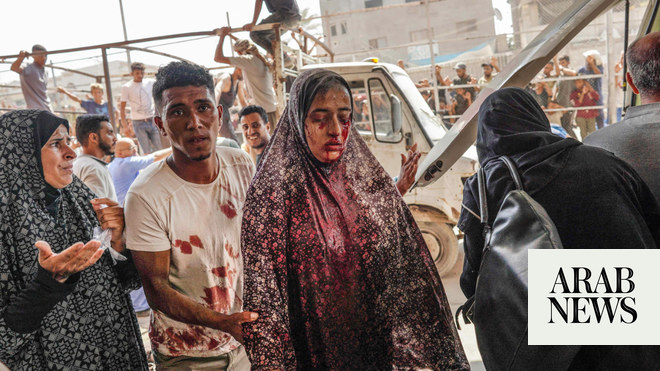BEIRUT: Israeli warplanes broke the sound barrier over Beirut, Sidon and other parts of Lebanon on Monday.
The planes carried out mock raids on the Hasbaya area and the occupied Shebaa farms, reaching as far as the Bekaa.
Although enemy operations on the southern front have significantly decreased, sporadic strikes continue.
One Israeli airstrike targeted a house in the town of Chihine in Tire district.
The airstrike resulted in injuries and the Syrian Social Nationalist Party reported that one of its members was killed.
Meanwhile, a Lebanese army unit found the wreckage of the drone in the town of Aaiha in the Rashaya district. The military command did not clarify the nature of the drone or whether it was Israeli-made or from another source.
A Lebanese army watchtower was attacked by Israel on the outskirts of Alma Al-Shaab in southern Lebanon on Sunday night, resulting in “moderate injuries to two soldiers who were taken to hospital for treatment,” according to the army.
Meanwhile, Hezbollah attacked the Israeli military compound Al-Malikiyah with an attack drone and hit one of its bunkers.
Domestic political attention was paid to developments in the south and the issue of the renewal of UNIFIL's mandate, which is on the agenda of the UN Security Council.
Interim Prime Minister Najib Mikati told a meeting with key officials that recent developments “naturally call for caution, but we continue to discuss with the parties involved and establish the necessary diplomatic contacts to prevent matters from spiraling into undesirable consequences.”
He added: “We cannot say that there are assurances and guarantees because no one can guarantee the intentions of Israel's enemy. However, we continue to make diligent efforts to resolve the situation.”
On the renewal of the mandate for the international force operating in southern Lebanon, Mikati said: “We are continuing diplomatic contacts to ensure a peaceful extension of the mandate of UNIFIL, whose vital role in the south we greatly appreciate, along with fruitful cooperation between them and the army.”
“From the contacts we made, we sensed a desire to maintain that role, especially in the delicate circumstances the South is going through.”
After meeting with Mikati, Foreign Minister Abdullah Bou Habib said he informed the prime minister that “there is a quasi-agreement to resume the work of UNIFIL troops for one year, under the same conditions and without any modifications.”
Bou Habib, who briefed Mikati after his return from New York, also said that American and European officials he met with emphasized “the importance of not expanding the war and trying to avoid an escalation of military actions in the south.”
He added: “There is a certain kind of optimism, or less pessimism, about the outbreak of a full-scale war in Lebanon.”
Also on Monday, a group of opposition MPs presented a petition asking Parliament Speaker Nabih Berri to convene a meeting to discuss the effects of the ongoing conflict between Hezbollah and the Israeli army, now in its 10th month.
Opposition MPs – Georges Okais, Mark Daou, Ashraf Rifi and Salim Sayegh – demanded that Berri “hold a parliamentary session at the earliest opportunity to discuss the ongoing war, prevent its escalation and ensure that the government fulfills its constitutional obligations”.
In their petition, MPs called for diplomatic efforts to return to the 1949 armistice agreement and full implementation of UN Resolution 1701.
They emphasized the need to end military actions “outside the Lebanese state and its institutions, declare a state of emergency in the south, hand over control to the army and allow it to respond to any attack on Lebanese territory.” .”
They spoke of the “escalation and threats reaching the highest level since October 8 and the growing fear of the expansion of the ongoing war, which has so far cost us hundreds of Lebanese lives and thousands of destroyed residential units, in addition to the economic and environmental damage caused by daily Israeli attacks and their consequences in light of the political and the economic crises that plague the country and the obstruction of the election of the country's president.
Nabil Qaouk, a member of Hezbollah's central council, said Israel had put the region “on a path of escalation”.
He said that “the fronts of support in Lebanon, Iraq and Yemen have entered a new phase and established new field equations through which we hope to increase the pressure on the Israeli enemy to stop the aggression in the Gaza Strip.
